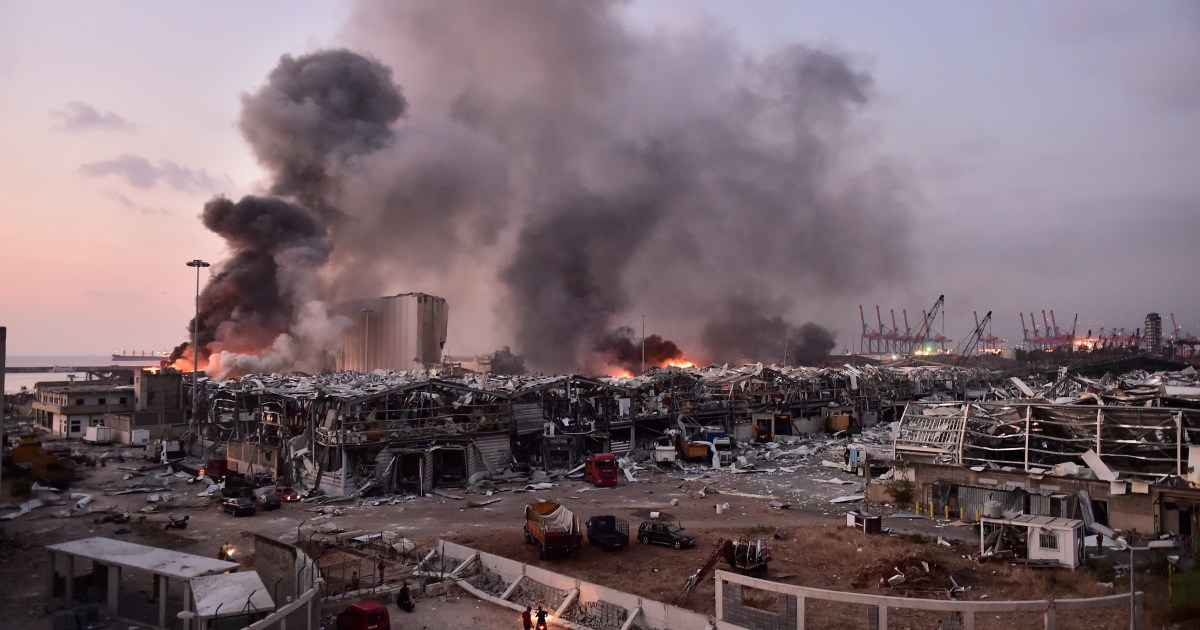A massive explosion occurred on Tuesday near the center of Beirut, killing dozens and injuring thousands. According to official statements, the explosion was caused by a shipment of ammonium nitrate estimated at 2750 tons, which has been present for 6 years in a warehouse without preventive measures. What is this article? What are its health effects? What is first aid from them?
The explosion sent shock waves around the Lebanese capital, and the glass facades of the buildings were destroyed, and the balconies collapsed. The Lebanese Interior Minister said that preliminary information indicates that high explosive materials confiscated for years and stored there have exploded. He later told Al-Jadeed TV that nitrate had been stored there since 2014.
Ammonium nitrate is a flammable substance in certain circumstances, and one of the materials used in a bombing in Oklahoma City in 1995 had caused 168 deaths, according to Reuters.
In 2013, an explosion occurred in a fertilizer plant in West Texas, Texas, leaving 14 people dead and nearly 200 injured, and investigators found that it was caused by ammonium nitrate.
What is this material?
Ammonium nitrate is a commercially available colorless crystalline solid chemical used for a variety of purposes, according to the National Library of Medicine in the United States, the National Center for Biotechnology Information.
The molecular formula of ammonium nitrate is "NH4NO3", which is soluble in water, does not burn easily, but it burns more easily if it is contaminated with flammable materials.
When burned, the ammonium nitrate material produces toxic nitrogen oxides.
Ammonium nitrate is used in the manufacture of fertilizers and explosives, the production of antibiotics and yeast, and is also used in the manufacture of matches and fireworks.
Physical properties
- Color: from white to gray to brown.
- Odorless.
- Melting temperature: 169 ° C (336 ° F) and decomposes at 210 ° C (410 ° F).
According to a post on the Department of Atmospheric and Oceanic Science at the University of Maryland's website, ammonium nitrate is a strong oxidizer, and contact with other materials may cause a fire or explosion.
According to the New Jersey Department of Health, ammonium nitrate can be absorbed through the skin.
Health effects
Inhalation of ammonium nitrate
It may cause respiratory irritation, and symptoms may include:
- Coughing.
- Sore throat.
- shortness of breath.
- At elevated temperatures, exposure to toxic NOx products can cause severe respiratory problems.
- Inhaling large quantities causes systemic acidosis and hemoglobin problems.
Swallow ammonium nitrate
- Dizziness.
- Abdominal pain.
- Vomiting.
- Bloody diarrhea.
- Weakness and cramps.
- Swallowing ammonium nitrate may cause methemoglobinemia, which leads to cyanosis, which is caused by a lack of oxygen in the blood.
Skin contact
- Skin irritation.
- Redness.
- Itching.
- the pain.
Eye contact
- Irritability.
- Redness.
- the pain.
Dozens of wounded civilians have been transferred to hospitals due to damage caused by the explosion that occurred in the port of Beirut, in the center of the Lebanese capital. # Lebanon pic.twitter.com/U9WKVAMxIa
- Siba Madwar Saba Madwar (@madwar_siba) August 4, 2020
first aid
Inhalation of ammonium nitrate
- Provide pure ventilation to the person.
- Get immediate medical attention for any difficulty breathing.
Swallow ammonium nitrate
- Do not induce vomiting.
- It is recommended to give large quantities of water, but it is forbidden to give anything by mouth to an unconscious person.
- Get medical attention right away.
Skin contact
- Remove any contaminated clothing.
- Wash the skin with soap and water for at least 15 minutes.
- Obtain medical care.
Eye contact
- Eye wash thoroughly with running water.
- Obtain medical care.

